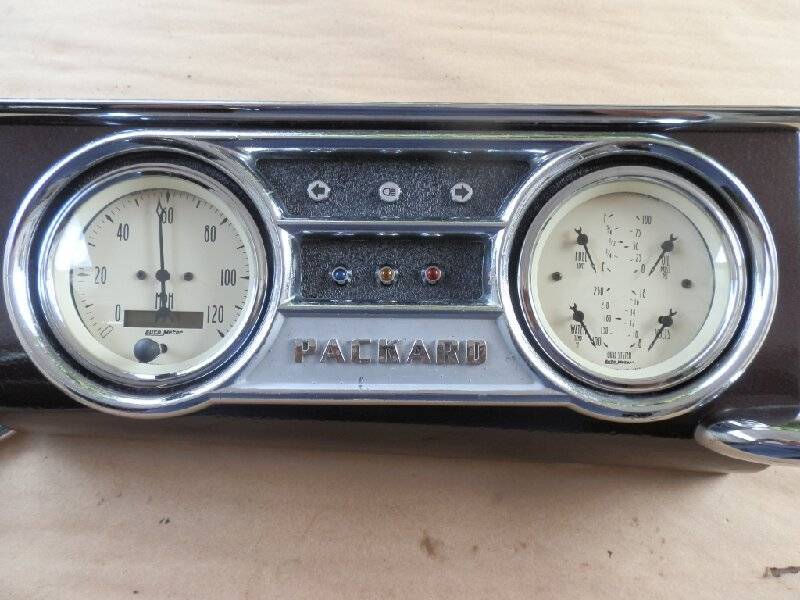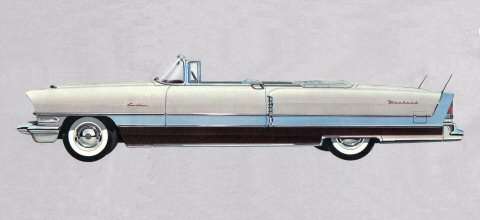|
Re: fuel tank sending unit
|
||||
|---|---|---|---|---|
|
Forum Ambassador
|
The senders on 48-50 models are completely different from the straight resistance type senders used before and after those years. Fords used a similar setup but as far as I know NOS Packard senders are almost extinct and no resistance type sender has been found that works satisfactorily. Ford units are almost as hard to come by. The only option I have heard of so far is to have your sender repaired if possible or, as some have done, change to a modern gauge setup and fit that unit in the old cluster.
The sender used in 22-23 series is a type sender that has no changing resistance but rather a bimetal arm working an ordinary on/off contact. The heater resistance in the sender can be measured but is a fixed value and depending on if the contact is opened or closed as the float is moved can be 0 ohms or some number. The sender heater is in series with another heater in the gauge portion and between the two the bimetal in the sender is made to move to open or close the contact to ground. The float puts more or less pressure on the bimetal strip attachment point depending on fuel level so length of time heater action needs to work on the bimetal is changed depending on what it takes to make the bimetal move and close the contact. Because the heater cools and heats as the contact opens or closes, the actual signal out to the gauge is just a series of pulses where the supply voltage going thru the gauge and sender is connected to ground for a period of time. The frequency and length of the pulses or connection to ground is determined by the changing pressure on the bimetal caused by the float.
Posted on: 2022/7/25 15:43
|
|||
|
Howard
|
||||
|
||||
|
Re: fuel tank sending unit
|
||||
|---|---|---|---|---|
|
Just can't stay away
|
Thank you Howard. this advice is very useful
Posted on: 2022/7/26 7:33
|
|||
|
||||
|
Re: fuel tank sending unit
|
||||
|---|---|---|---|---|
|
Home away from home
|
Seems like someone with electrical knowhow could come up with a transistorized on off circuit that could work.
Posted on: 2022/7/26 10:13
|
|||
|
||||
|
Re: fuel tank sending unit
|
||||
|---|---|---|---|---|
|
Forum Ambassador
|
Quote:
You would think it would be easy but so far not the case. The 48-50 oil and temp senders work the same way and last I heard those senders were also fairly hard to find. Actually kind of surprised one of the Ford vendors has not come up with something since some of their models are in the same situation. Lots more Fords were made than Packards and maybe they have. If anyone has seen something let us know. A little module that would take output from a plentiful 10-70 ohm resistance type sender as is used on later Packards, Fords, and other cars which could convert the resistance change to pulses and also be able to replace the oil and temp senders would be an ideal solution. Tinman_70 did some experiments with different ohm range universal resistance type fuel senders and while I believe he got close to one that worked reasonably well as far as making the gauge read correctly for a short time, he never got to the point of being able to test and see if it was stable over a long period of time without the intermittent cooling of the heaters the contact pulsing allows. After all that work he still decided it would be better in his case to go modern all the way. For those that want to keep a stock look, Classic Instruments offers a retrofit service where they will mount modern guts but try to use the old faces. No idea what restrictions or other requirements there might be or even the cost but it it was the choice of under dash hang ons vs no working gauges maybe worth the outlay. For Tinman's 49 which, with the added AC, was going to need 12v he went with an Autometer setup and completely replaced the orignal gauges using the clock space. Added the matching speedo since his original also needed repair. All in all, not a horrible solution. Here is an in progress shot and the finished product after he mounted things in a freshly painted and good chrome surround looks very decent.
Posted on: 2022/7/26 12:00
|
|||
|
Howard
|
||||
|
||||
|
Re: fuel tank sending unit
|
||||
|---|---|---|---|---|
|
Home away from home
|
Yes it looks very well done.
Posted on: 2022/7/26 18:12
|
|||
|
||||

 12V_11.jpg (104.70 KB)
12V_11.jpg (104.70 KB)






